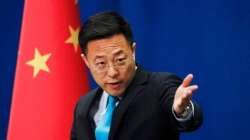Quad meet: Beijing says US playing up 'China threat' theory to stoke confrontation
In November 2017, the US, Australia, India and Japan gave shape to the long-pending proposal of setting up the Quad to develop a new strategy to keep the critical sea routes in the Indo-Pacific free of any influence, amid China's growing military presence in the strategic region.

Terming the Quad alliance between the US, India, Australia and Japan as a "tool" to contain China's rise and to maintain American hegemony, Beijing said on Friday that the grouping is a 'deliberate move' to stoke confrontation and it is doomed to fail. China, which has territorial disputes with many countries in the strategic Indo-Pacific region, has been opposing the Quad alliance since its formation.
In November 2017, the US, Australia, India and Japan gave shape to the long-pending proposal of setting up the Quad to develop a new strategy to keep the critical sea routes in the Indo-Pacific free of any influence, amid China's growing military presence in the strategic region. “China believes that the so-called Quad group cobbled together by the US, Japan, India and Australia is essentially a tool for containing and besieging China to maintain US hegemony,” Chinese Foreign Ministry spokesman Zhao Lijian told a media briefing in Beijing.
“It aims to stoke confrontation and undermine international solidarity and cooperation”, he said while responding to a question that Quad foreign ministers opened their talks in Melbourne, saying that the countries need to stand up those who seek to coerce them raising the long-term issue of China's rising power. “I want to stress that as the Cold War is long over, the attempt to forge a so-called alliance to contain China wins no support and leads nowhere,” he said.
“Relevant countries should abandon the antiquated Cold War mentality, correct the wrong approach of bloc confrontation and geopolitical games, and contribute to peace and stability in the Asia-Pacific”, Zhao said. Answering another question on US Secretary of State Antony Blinken’s remarks that China had been acting more aggressively both at home and in the region, but he didn’t consider a conflict in the Indo-Pacific region as inevitable, Zhao said, “the remarks made by the US politician are nothing but a rehash of political lies.”
“The US is playing up the “China threat” theory in order to smear, oppress and contain China’s development. This fully exposes the deeply-entrenched Cold War mentality and ideological bias of the US side. Speaking of acting aggressively in this region and beyond, the US is second to none,” he asserted. Ahead of the Quad Foreign Ministers meeting, Zhao said on Wednesday that China rejects creating exclusive cliques and inciting bloc confrontation.
"We hope the US and other countries concerned will grasp the trend of the times, adopt a proper mind-set and discard the Cold War mentality,” he said.
The foreign ministers of the Quad grouping on Friday held extensive talks in Melbourne amid escalating tension between Russia and NATO countries over Ukraine, the Afghan crisis and increasing concerns over China's "coercion" in the Indo-Pacific region.
China claims nearly all of the disputed South China Sea, though Taiwan, the Philippines, Brunei, Malaysia and Vietnam all claim parts of it. Beijing has built artificial islands and military installations in the South China Sea. Beijing is also involved in a maritime dispute with Japan over the East China Sea.
External Affairs Minister S. Jaishankar, US Secretary of State Antony Blinken, Japanese Foreign Minister Yoshimasa Hayashi and Australia's Foreign Minister Marise Payne jointly called on Australian Prime Minister Scott Morrison ahead of their talks in Melbourne.
At a joint media briefing after the talks, Australian foreign minister Payne said the Quad foreign ministers reaffirmed their support to principles of openness, protection of national sovereignty and observance of rules and fair play, in remarks seen as a message to China. Jaishankar said the interactions made it evident that robust bilateral relations between the Quad countries, their strategic convergences and shared democratic values have all combined to make the grouping a vibrant and substantial framework. The Quad has worked well as a force for global good due to the strong bilateral relations between India, the US, Australia and Japan, Jaishankar added.
Also Read | Quad meet: Foreign ministers' resolve to work towards free, open Indo-Pacific
Also Read | Quad foreign ministers to meet today amid Ukraine crisis